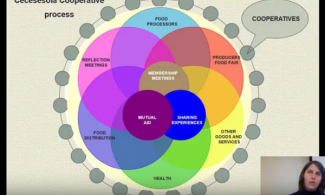By Rob Brown, IHA office manager, and Bethany Schroeder, IHA board president
Access to health care is a major concern to many of us, but for some it poses a critical problem. Today more than 46 million Americans have no health insurance, even though an estimated 80 percent of these uninsured people do have jobs. What's more, experts believe that up to 80 million Americans have insufficient healthcare benefits to meet their needs. Some of the obvious stressors among the un- and underinsured include potential health-related bankruptcies, difficulties in deciding how to allocate limited household funds, locating physicians and other clinical providers willing to give care, and planning for a future that holds little promise of improvement.
Ten years ago, Ithacan activist and innovator Paul Glover began talking to community members about a grassroots approach to the problem as it existed then and still does to this day. Inspired by the early beginnings of the Canadian national healthcare system as well as the collective approach to healthcare financing among the Amish, an idea dubbed the "Ithaca Health Fund" was born. Glover's original vision was simple:
Focus on the local community for solutions, rather than relying on the benevolence of corporate or governmental entities.
Develop the project with a democratic infrastructure, centered on the thoughts and identified needs of members.
Offer a sliding scale fee to healthcare providers who agree to honor discounts to other members.
Set funds aside for a clinic and other community health programs.
The new organization gathered together members who supported the idea, each of whom joined for $100 per year. As others joined and the organization's finances grew, an ever-increasing selection of healthcare services became available. At the same time, the organization began setting aside money for other community health projects.
Ten years later, the Ithaca Health Alliance, Inc. (IHA) is going strong. Following the same principles under which the Health Fund was founded, the IHA has an active membership of 700 people. Members elect the board of directors from among the membership, and the members, by way of member committees, along with the board jointly govern the IHA through shared and ongoing input.
The Ithaca Health Fund program of the IHA has awarded more than $115,000 in grants. IHA members can expect, for example to receive grants of up to $3,000 per year for specific healthcare needs. The largest member grant categories are dedicated to emergency needs but include the cost of treatments for broken bones, preventive care, and diagnostic exams. The IHA seeks to expand grant categories annually, based on the needs expressed and resources of members. A revolving loan fund provides interest-free member assistance for dental care, in addition to the benefits available under the grants program.
Over 150 healthcare providers are IHA members, and they give discounts typically from 5 to10 percent of the cost of service to others in the organization. Providers include professionals from conventional and complementary/alternative modalities. Most providers live and practice in Ithaca and the surrounding county townships. IHA maintains a provider member directory on its website, which promotes these providers' commitment to community health and helps members find them.
Any resident of New York State can join the Ithaca Health Alliance for the original $100 per year, with discounted membership rates available to spouses or partners. Memberships at discounted rates are also available to the employees of area businesses and community organizations, when employees join as a group.
The IHA Community Grants program offers small grants to community organizations conducting health projects. For example, the Cayuga Nature Center received two grants, one in 2005 and another in 2006, to train its Bobcat camp counselors in CPR. Funds also helped to procure much needed medical supplies and protective gear for CNC staff. Grants have been awarded to Tioga Community Action for its annual Health Fair and Expo and to the Riverside School for its health walk. In 2006, the IHA was pleased to participate in Cornell Extension's program, making available community-supported agriculture shares to low-income families.
The Ithaca Health Alliance education program continues to develop. This program has sponsored monthly speakers' events at intervals during the past two years, opening these events to everyone, and has recently undertaken the publication of a quarterly newsletter. The newsletter is either mailed or emailed to members. In an effort to fulfill its commitment of education to the community at large, the IHA distributes without charge copies of the newsletter at local coffee shops and other public places. The IHA also maintains a library of information in our offices for browsing and borrowing.
With the opening of the Ithaca Free Clinic in January, 2006, the IHA fulfilled one of its earliest dreams: making free care available to our uninsured residents. In doing so, Ithaca has joined the ranks of generally much larger cities in the U.S. Financed through membership savings from 1997 to its inception, members continue to support the IFC, as do generous donations from the community. The IHA has recently begun to receive competitive grants that will allow for better-supported and expanded services.
Open from 2 to 6 on Mondays and 4 to 8 on Thursdays, with a pediatric clinic open from 4 to 8 on the fourth Tuesday of every month, the Ithaca Free Clinic is located at 225 South Fulton Street, Suite B, in Ithaca. The IFC is one of the first medically integrated free clinics in the U.S., where both conventional and complementary healthcare professionals treat visitors. A physician and a registered nurse are always on duty and are typically joined by other providers, such as herbalists, massage therapists, and acupuncturists, just to name a few. A large group of support personnel manage the office and advise patients and visitors about community resources. Upwards of 75 volunteers, including students from TC3, Ithaca College, and Cornell University, as well as many interested and dedicated community members freely contribute their time to the ongoing success of the Clinic.
The Ithaca Health Alliance website can be accessed at www.ithacahealth.org. The site offers information about the structure of the IHA, its programs, and the operation of the Ithaca Free Clinic. We welcome questions about volunteer opportunities, patient services, and upcoming IHA developments and can be reached at 607-330-1253 or 607-330-1254.



Add new comment